Find out how the roles of Rachel and Zipporah as shepherdesses shape biblical narratives and offer timeless lessons for today's world.
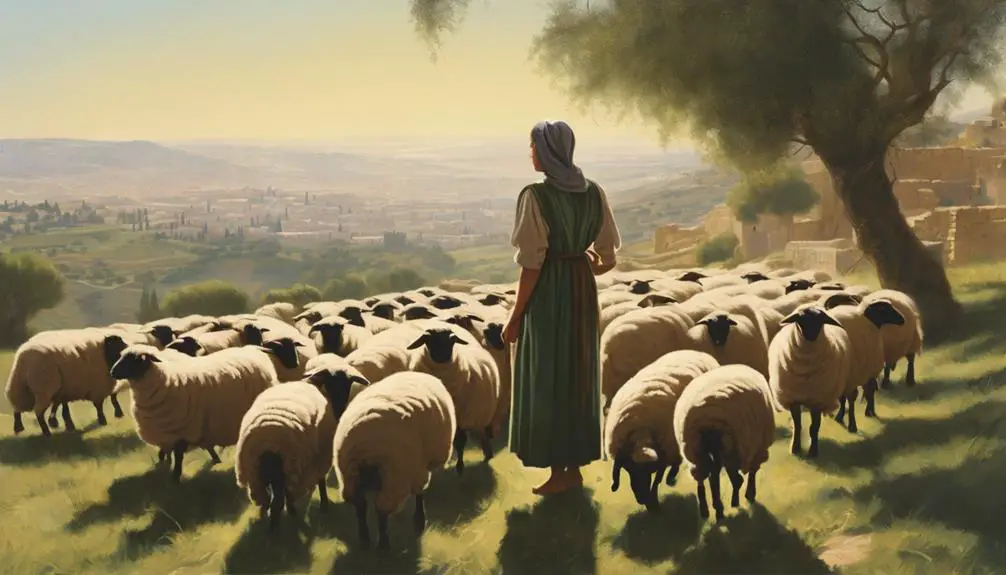
Shepherdess in the Bible
The shepherdess, a figure traditionally symbolizing gentleness and nurturing, holds a unique place in the Bible's complex tapestry. You've likely heard of Rachel and Zipporah, but do you truly understand their roles as shepherdesses and the significance of these roles within the biblical landscape?
What lessons can be gleaned from their stories and how can they be applied in today's context? Stick around as we explore these questions, and more, in a thought-provoking journey through the pages of Scripture.
Key Takeaways
- Biblical shepherdesses symbolize virtues like humility, strength, and faith, serving as spiritual guides and leaders.
- Notable figures like Zipporah and Rachel displayed strong leadership, resilience, and unwavering faith in their stories.
- Shepherdesses demonstrate key attributes such as quick thinking, courage, and resilience in crisis situations.
- Emulating the qualities of biblical shepherdesses can lead to personal growth and improved leadership skills.
The Role of Shepherdesses in the Bible
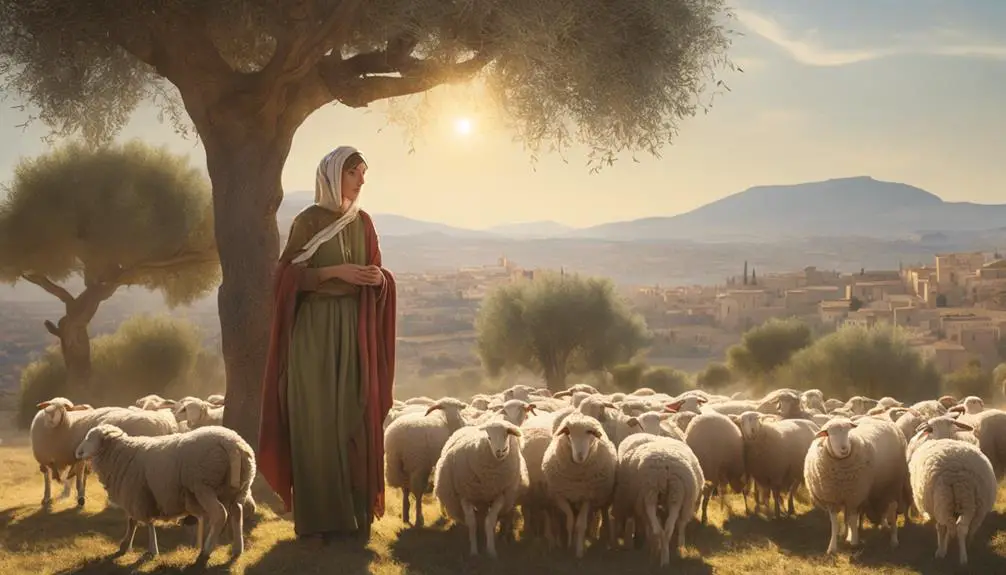
In the biblical context, shepherdesses play pivotal roles, often serving as powerful symbols of humility, strength, and unyielding faith. They're not just mere bystanders or supporting characters, but embody a significant part of the biblical narrative. Their symbolism in the holy scriptures is profound and multi-faceted.
'Shepherdesses' symbolism' goes beyond the literal interpretation of their job. Yes, they physically tend to and guard sheep, but in a larger sense, they're also seen as guardians of their faith and their people. They often represent individuals who guide their 'flock' towards the path of righteousness, embodying virtues like patience, fortitude, and self-sacrifice. They're the quiet yet steadfast forces that keep their communities together.
Biblical representations of shepherdesses further reinforce their symbolic value. They're typically presented as resilient, compassionate, and selfless figures, constantly navigating challenging terrains and warding off threats to protect their flock. These depictions serve to underscore their role as nurturing leaders and spiritual guides.
Notable Biblical Shepherdesses
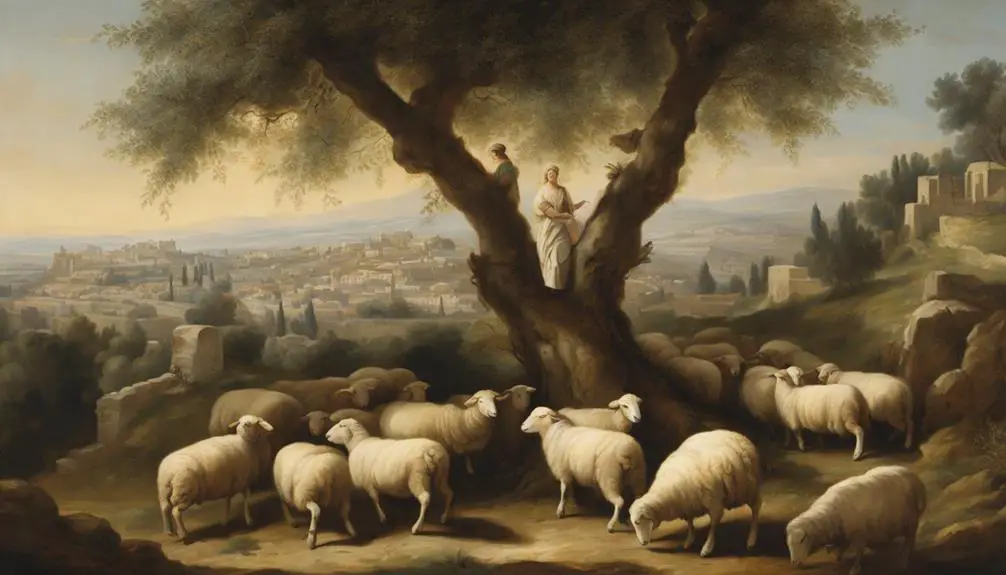
Delving into the lives of notable shepherdesses in the Bible, you'll encounter figures of immense faith, resilience, and leadership. These women weren't merely shepherds of sheep, but also of their families and tribes. Shepherdess symbolism is steeped in these attributes, reflecting the strength and tenacity of these biblical characters.
Consider Zipporah and her sisters, daughters of the priest of Midian. They were responsible for the family's flock, demonstrating significant tribal leadership. Zipporah, in particular, is renowned for her quick thinking and courage in a moment of crisis.
And there's the prophetess Deborah, although not explicitly identified as a shepherdess, her leadership role over Israel resonates with shepherdess symbolism. She guided her tribe with wisdom and courage, embodying the shepherdess' traits in her leadership.
To provide a clearer perspective, let's look at a comparison:
Name |
Leadership Role |
|---|---|
Zipporah |
Protected and sustained her family's flock, demonstrated quick thinking and courage |
Deborah |
Guided Israel with wisdom and courage, embodied shepherdess traits in her leadership |
These women's stories amplify the shepherdess symbolism, showcasing their roles as leaders within their tribes and their unwavering faith.
The Story of Rachel: A Shepherdess
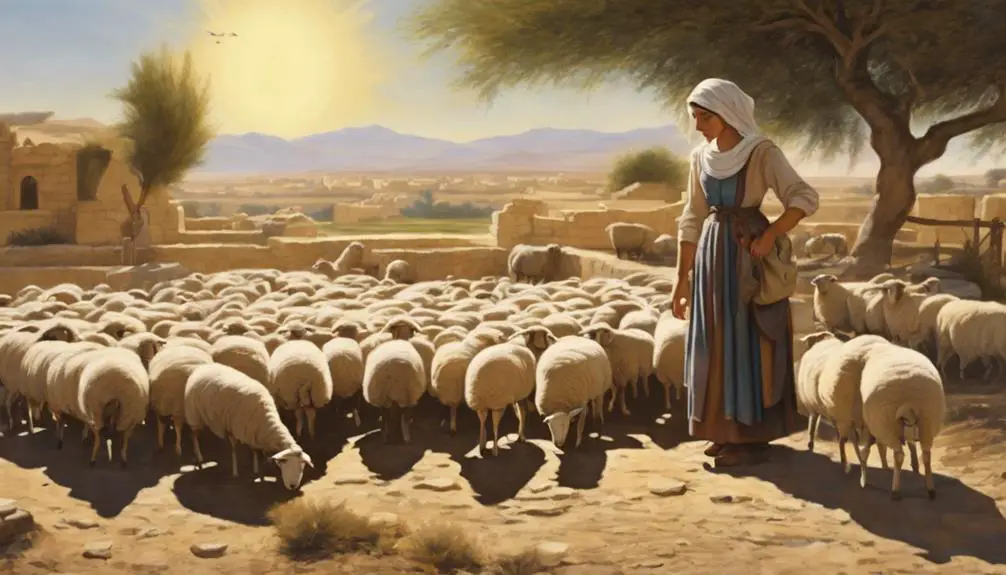
Continuing our exploration, let's consider the story of Rachel, another prime example of a biblical shepherdess whose life offers a rich tapestry of leadership, resilience, and faith. She was the youngest daughter of Laban and her work as a shepherdess was a testament to her strength and dedication.
Her story is riddled with Divine Encounters, from meeting her future husband Jacob at a well to wrestlings with God over her desire for children. These encounters shaped her life and left a remarkable legacy that we now refer to as Rachel's Legacy. Here are some key points:
- Rachel's unwavering faith and resilience in the face of personal struggles and societal norms.
- Her strong leadership, often overlooked but evident in her management of the flock and her household.
- The Divine Encounters that guided her life, from meeting Jacob to her dealings with family predicaments.
It's clear that Rachel was more than just a shepherdess. Her story is a testament to strong leadership, relentless faith, and resilience in the face of adversity. And through her story, we're given a powerful example of how Divine Encounters can shape our lives, leaving a lasting legacy.
The Courageous Shepherdess: Zipporah
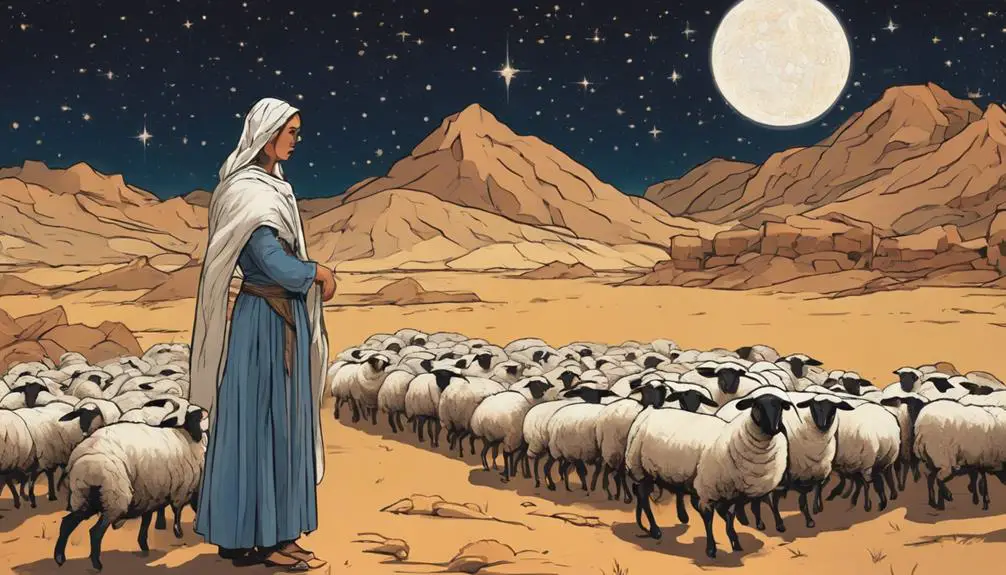
Shifting our focus, let's now delve into the life of Zipporah, a courageous shepherdess whose story paints a vivid picture of bravery and unwavering faith. Married to Moses, Zipporah's influence was crucial during a critical incident in Egypt.
Born into the Midianite culture, Zipporah was the daughter of Jethro, the priest of Midian. Her life was intertwined with the wilderness, the flocks, and the trials and triumphs of shepherdess life.
Here's a snapshot of Zipporah's life:
Aspect |
Details |
|---|---|
Birthplace |
Midian |
Father |
Jethro |
Spouse |
Moses |
Notable Act |
Saved Moses' life |
Zipporah's quick thinking and courageous act of circumcising her son saved Moses' life and ensured the continuation of their divine mission. Her swift action indicates her deep understanding of God's laws, showing her strength, courage, and unwavering faith.
Lessons Learned From Biblical Shepherdesses
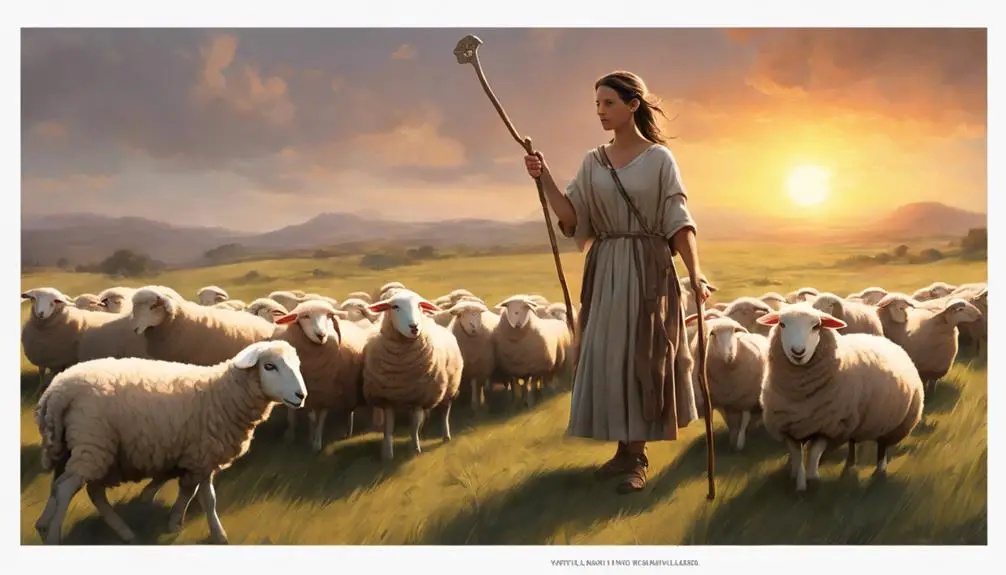
Drawing from the life stories of shepherdesses like Zipporah, we can extract valuable lessons that resonate even in today's context. The shepherdess symbolism in the Bible often goes hand in hand with traits such as strength, wisdom, and leadership, which are all qualities that you can emulate in your life.
- Strength: Biblical shepherdesses faced numerous challenges, yet they stood firm. Zipporah, for instance, displayed immense courage and determination in protecting her family. This shows that you, too, can overcome adversities with resilience.
- Wisdom: Shepherdesses weren't only physically strong, but they also demonstrated wisdom and foresight. They made crucial decisions that impacted not only their flock but also their communities. Thus, you can develop wisdom in handling your daily affairs.
- Leadership: The role of shepherdesses was a significant one, often associated with female leadership. They led their flock with care and diligence, teaching us that leadership involves not only authority but also responsibility and compassion.
Frequently Asked Questions
What Is the Significance of the Shepherdess Role in the Overall Culture and Society During Biblical Times?
In biblical times, the role of a shepherdess carried significant symbolism. It represented both nurturing and leadership, challenging gender norms of the time. This could be seen as an early form of biblical feminism.
You'd find the shepherdess often symbolizing guidance and care, attributes gendered as feminine. So, their role wasn't just practical but deeply symbolic, reflecting shifts in culture and society.
What Are Some Specific Biblical Passages That Mention Shepherdesses?
You're asking for specific biblical passages that mention shepherdesses.
Well, Exodus 2:16 presents a significant instance where Moses meets Zipporah, a shepherdess.
This passage not only highlights shepherdess symbolism, embodying nurturing and guidance, but also underscores biblical feminism, as Zipporah steps into the traditionally male role, illustrating women's capacity and importance in society.
It's an essential passage to understand the role and impact of women in biblical times.
How Does the Depiction of Shepherdesses in the Bible Compare to the Depiction of Shepherds?
In comparing the portrayals, you'll find shepherdess symbolism often highlights feminine leadership, while shepherds are often seen as robust protectors. The Bible tends to portray shepherdesses as caring and nurturing, reflecting traditional feminine qualities.
On the other hand, shepherds are depicted as strong leaders and guides. However, both roles share responsibilities of guiding and protecting their flock, showcasing a common theme of leadership and dedication.
Were There Any Specific Responsibilities or Tasks That Were Unique to Shepherdesses in the Bible?
You're asking if there were unique tasks or responsibilities for shepherdesses. Yes, they did have specific roles. Shepherdess symbolism often represents nurturing and protection.
They were expected to care for the young and weak lambs, displaying a form of female leadership. Moreover, their duties often symbolized spiritual guidance, as they led their flock, teaching us about responsibilities, care, and leadership in a unique, feminine way.
Can We Find Any Archaeological or Historical Evidence to Support the Existence of Shepherdesses During Biblical Times?
You're asking if there's archaeological or historical evidence supporting the existence of women in biblical times performing jobs like shepherding. Indeed, artifacts like depictions of women in shepherdess clothing styles suggest this.
However, concrete evidence is limited due to the nature of such jobs being primarily oral and experiential, leaving few physical traces. It's a complex issue, requiring expert interpretation of available archaeological data.
Conclusion
In examining biblical shepherdesses like Rachel and Zipporah, you've seen how their roles were significant, showcasing courage, faith, and resilience. They've taught you valuable lessons, like stepping into leadership and standing strong in adversity.
Remember, these women weren't just shepherdesses, they were pivotal figures in their biblical narratives. The stories of these shepherdesses prove that no matter your role, you can make a profound impact.



Sign up